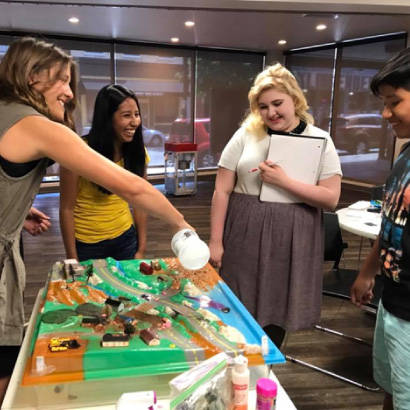
I found my way to the parks and recreation field through environmental education. While environmental educators have been working in communities for decades, the field is currently evolving to better reach underserved communities, particularly in urban and suburban areas.
The City of Covington’s Recreation Division mission is to build community and promote quality of life. We do this not only through services with leisurely value, but also services that instill confidence, a sense of civic engagement and wellbeing. According to the North American Association for Environmental Education (NAAEE), the five key characteristics that engage communities are as follows:
- Community centered, putting community interests at the heart of environmental education
- Based on sound environmental education principles
- Collaborative and inclusive, both relationships, partnerships and coalitions
- Oriented toward capacity building and civic action
- A long-term investment in change, a commitment to relationship building and ongoing engagement
The NRPA Great Urban Parks Campaign Community Engagement grant program funded by Southwest Airlines offered us an opportunity to pilot a work study program to arm young people with the necessary knowledge and skills to address real issues in our community.
The grant recipients were announced within the last few weeks of the academic year. We scrambled to distribute the opportunity to teachers to help recruit high school students before summer break. Fortunately, through strong existing partnerships, identifying quality instructors was not as much of an issue.
One student was recruited through the teacher listserv. The other three students came through another stronger recruitment approach: relationships.
In 2015, my partner and I organized a summer camp program geared towards Latino youth. We recruited 14 students. Only 5 fully completed the program. We quickly learned transportation and trust were our biggest barriers when serving these families.
The best outcome from the program was a budding relationship with one of our students, John. He was exceptionally excited and invested in the experience. I became friends with his parents and soon he was bringing his younger siblings along to other programs we hosted.
When we received the Great Urban Parks funding, John was the first student I told. He and his older sister applied. Later, one of John’s friends from the soccer team joined our work study group.
Over the past two months the students have learned about the significance of water, various types of stormwater issues, as well as how to sample and test water quality. Last week they transitioned to studying the built environment; exploring how to read maps and understand land use, as well as calculate and understand the impact of stormwater runoff.
This week the students are participating in an overnight trip to the Edge of Appalachia Preserve, thanks to a partnership with Groundworks Cincinnati. They will have the opportunity to visit a natural stream system and compare it to an urban system. For most of our students, this program has provided the opportunity for their first camping and kayaking experiences.
The final assignment for the work study group will be to develop an Urban Ecology Workshop for the community. The students will become the instructors. They will lead sessions about water quality issues in our community and present green infrastructure project proposals. The public will vote on the best proposal and a public installation event will follow.
The significance of this pilot program is the development of a social infrastructure built on mutual trust and respect, which is essential in recruiting and retaining underserved families to programs. By engaging the students through effective environmental education, we anticipate they will have increased capacity to affect positive change in their community.
How have you engaged your community create change?

Read the other blogs in the Community Engagement Series:
- How We Are Transforming Contaminated Land into Natural Oasis through Community Engagement
- Greening Gary, IN from the Ground Up through Community Engagement
Rosie Santos is the City of Covington, Kentucky’s Parks and Recreation Manager.

